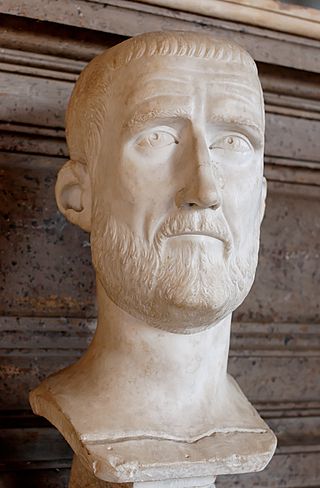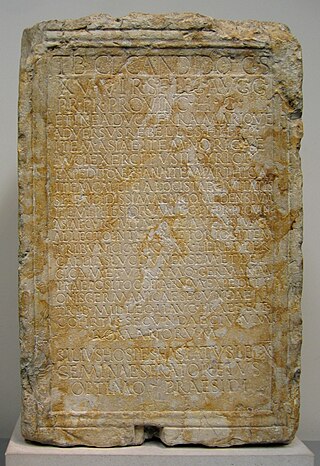Related Research Articles

Septimia Zenobia was a third-century queen of the Palmyrene Empire in Syria. Many legends surround her ancestry; she was probably not a commoner and she married the ruler of the city, Odaenathus. Her husband became king in 260, elevating Palmyra to supreme power in the Near East by defeating the Sasanian Empire of Persia and stabilizing the Roman East. After Odaenathus' assassination, Zenobia became the regent of her son Vaballathus and held de facto power throughout his reign.

Aurelian was a Roman emperor who reigned from 270 to 275 during the Crisis of the Third Century. As emperor, he won an unprecedented series of military victories which reunited the Roman Empire after it had nearly disintegrated under the pressure of barbarian invasions and internal revolts. Born in modest circumstances, most likely in Moesia Superior, he entered the Roman army in 235 and climbed up the ranks. He went on to lead the cavalry of the emperor Gallienus, until Gallienus' assassination in 268. Following that, Claudius Gothicus became emperor until his own death in 270. Claudius' brother Quintillus then ruled for three months, before Aurelian took the empire for himself.

The Crisis of the Third Century, also known as the Military Anarchy or the Imperial Crisis (235–284), was a period in Roman history during which the Roman Empire nearly collapsed under the combined pressure of repeated foreign invasions, civil wars and economic disintegration. At the height of the crisis, the Roman state split into three distinct and competing polities.

Marcus Aurelius Probus was Roman emperor from 276 to 282. Probus was an active and successful general as well as a conscientious administrator, and in his reign of six years he secured prosperity for the inner provinces while withstanding repeated invasions of barbarian tribes on almost every sector of the frontier.

Sponsianus, also known in English as Sponsian, may have been a Roman usurper during the third century. His existence is implied by a series of coins bearing his name, ostensibly part of a hoard excavated in the eighteenth century. No corresponding figure named Sponsianus is mentioned in any ancient sources, and the coins are widely believed to be the work of modern forgers. However, a study of wear marks on the coins published in November 2022 concluded that the coins were authentic, supporting Sponsian's existence as a historical figure. The study's methodology and conclusions have been criticized by a number of scholars.

Gaius Pius Esuvius Tetricus was a Gallo-Roman nobleman who ruled as emperor of the Gallic Empire from 271 to 274 AD. He was originally the praeses of Gallia Aquitania and became emperor after the murder of Emperor Victorinus in 271, with the support of Victorinus's mother, Victoria. During his reign, he faced external pressure from Germanic raiders, who pillaged the eastern and northern parts of his empire, and the Roman Empire, from which the Gallic Empire had seceded. He also faced increasing internal pressure, which led him to declare his son, Tetricus II, caesar in 273 and possibly co-emperor in 274, although this is debated. The Roman emperor Aurelian invaded in 273 or 274, leading to the Battle of Châlons, at which Tetricus surrendered. Whether this capitulation was the result of a secret agreement between Tetricus and Aurelian or that surrender was necessary after his defeat is debated. Aurelian spared Tetricus, and made him a senator and the corrector (governor) of Lucania et Bruttium. Tetricus died of natural causes a few years after 274.
Virius Lupus was a Roman soldier and politician of the late 2nd and early 3rd century.

Septimius Vaballathus was emperor of the Palmyrene Empire centred at Palmyra in the region of Syria. He came to power as a child under his regent mother Zenobia, who led a revolt against the Roman Empire and formed the independent Palmyrene Empire.
Urbanus was a Roman usurper.

The Palmyrene Empire was a short-lived breakaway state from the Roman Empire resulting from the Crisis of the Third Century. Named after its capital city, Palmyra, it encompassed the Roman provinces of Syria Palaestina, Arabia Petraea, and Egypt, as well as large parts of Asia Minor.
Septimius Antiochus was a Roman usurper in Syria during the 3rd century.
Septimus or Septimius may refer to:
Quintus Anicius Faustus was a Roman military officer and senator who was appointed suffect consul in AD 198.
Pomponius Bassus [...]stus was a Roman Senator of Anatolian descent who lived in the Roman Empire.
Aurelius/Iulius Marcellinus was a Roman soldier and Imperial functionary who had a brilliant equestrian career and was elevated to the Senate when he was chosen by the Emperor Aurelian as his consular colleague. His appointment as Consul is thought to have been a reward for his loyalty and steadfastness in 273 when, as Aurelian's deputy in charge of the eastern provinces of the Empire where the authority of the Imperial Government had only recently been restored, he resisted attempts to suborn him by a rebellious faction in the city of Palmyra.
Gaius Pomponius Bassus Terentianus was a Roman military officer and senator.
Gaius Caesonius Macer Rufinianus was a Roman military officer and senator who was appointed suffect consul in around AD 197 or 198. He was the first member of gens Caesonia to hold a consulship.

Marcus Sedatius Severianus was a Roman senator, suffect consul, and general during the 2nd century AD, originally from Gaul. Severianus was a provincial governor and later a provincial consul. The peak of his career was as suffect consul for the nundinium of July–September 153 as the colleague of Publius Septimius Aper. He was governor of Cappadocia at the start of the Roman war with Parthia, during which he was convinced by the untrustworthy oracle to invade Armenia in 161. Sedatius committed suicide while under siege in the Armenian city of Elegeia, on the upper Euphrates. The legion he led was wiped out shortly after. He was replaced as governor of Cappadocia by Marcus Statius Priscus.

Tiberius Claudius Candidus was a Roman general and senator. He played an important role supporting Septimius Severus in the struggle for succession following the assassination of the emperor Pertinax in 193 CE.
References
- ↑ White 2005, p. 84.
- ↑ Mennen 2011, p. 255.
- ↑ Hartmann 1982, p. 162.
Books
- Hartmann, Felix (1982). Herrscherwechsel und Reichskrise : Untersuchungen zu den Ursachen und Konsequenzen der Herrscherwechsel im Imperium Romanum der Soldatenkaiserzeit (3. Jahrhundert n. Chr.) . P. Lang. ISBN 978-3820461954.
- Mennen, Inge (2011). Power and status in the Roman Empire, AD 193-284. Leiden: Brill. ISBN 9789004203594.
- White, John F. (2005). Restorer of the World: The Roman Emperor Aurelian. Staplehurst: Spellmount. ISBN 9781862272507.